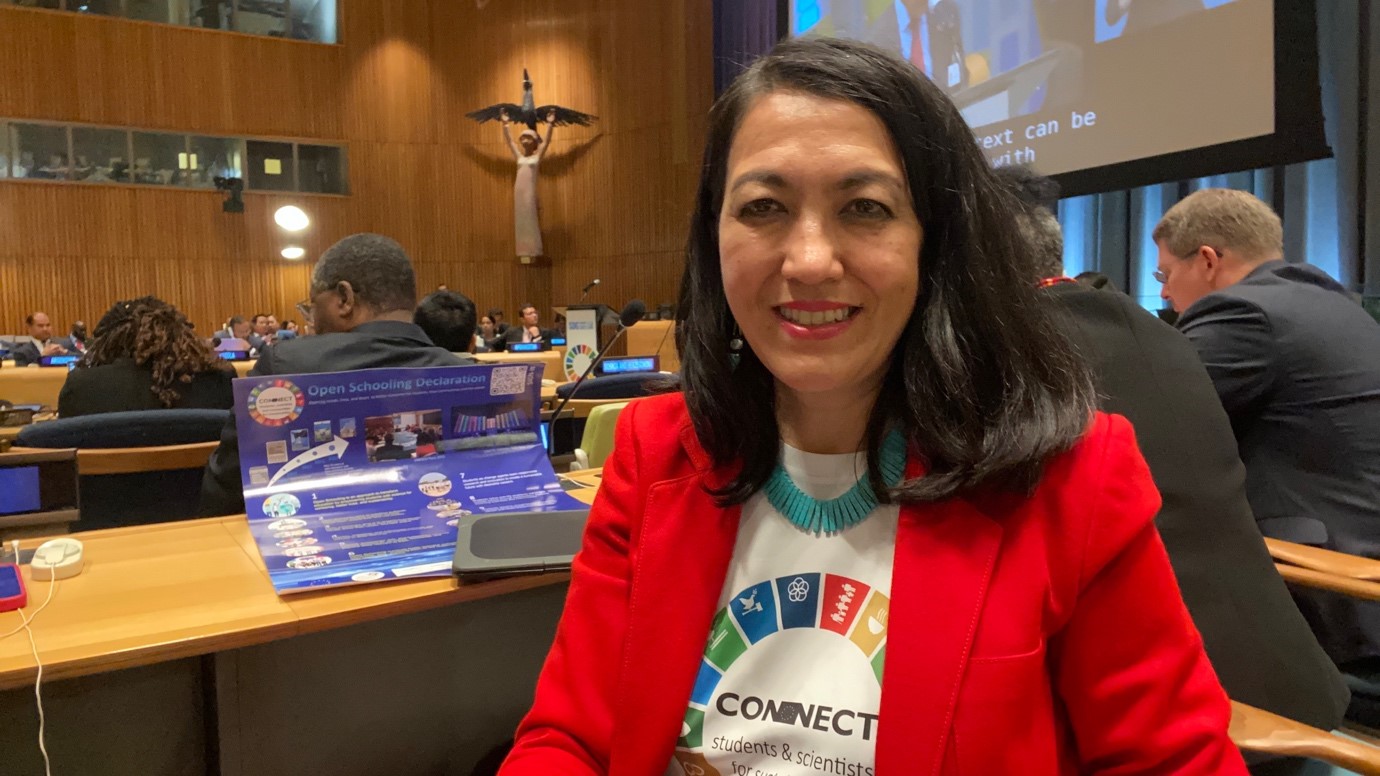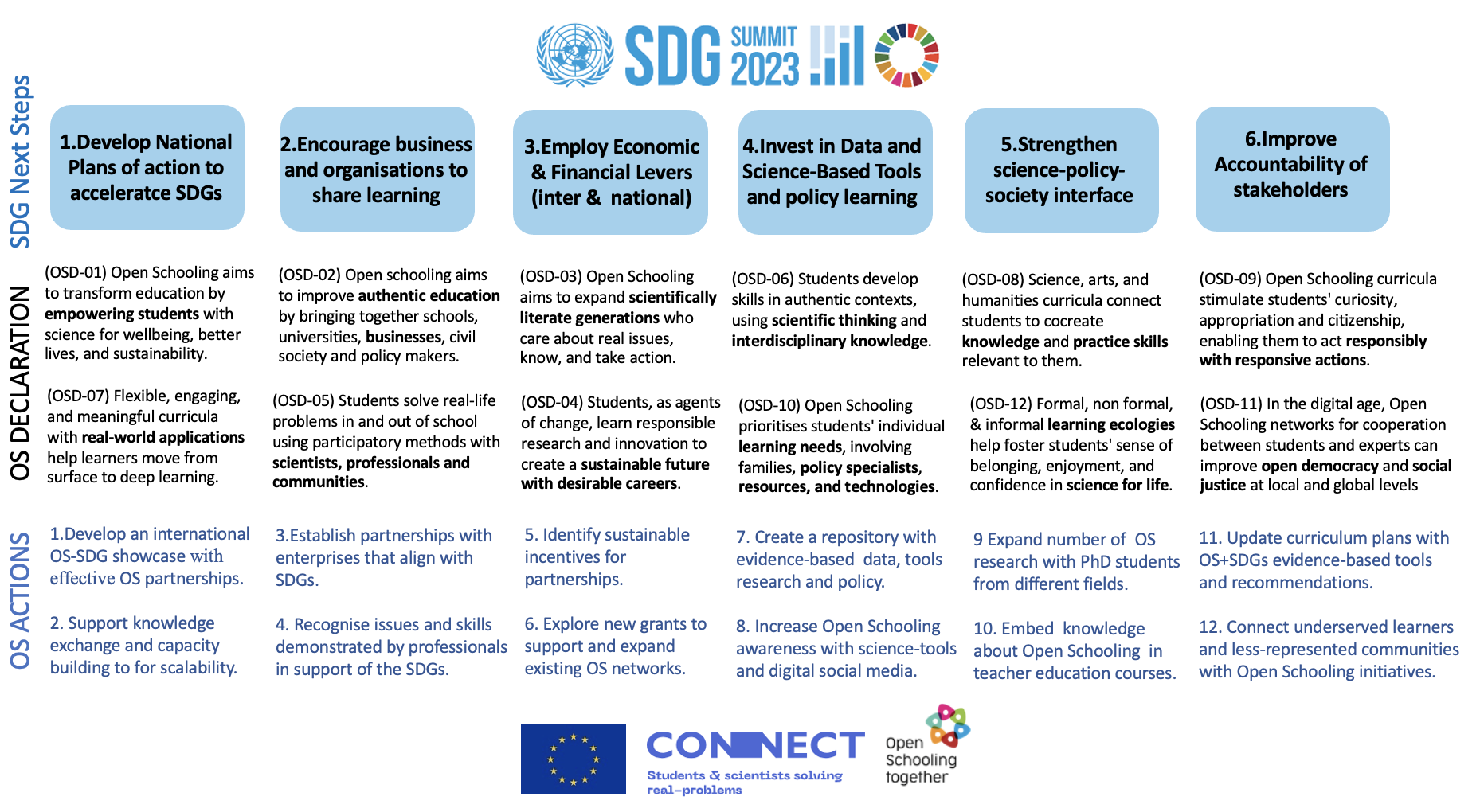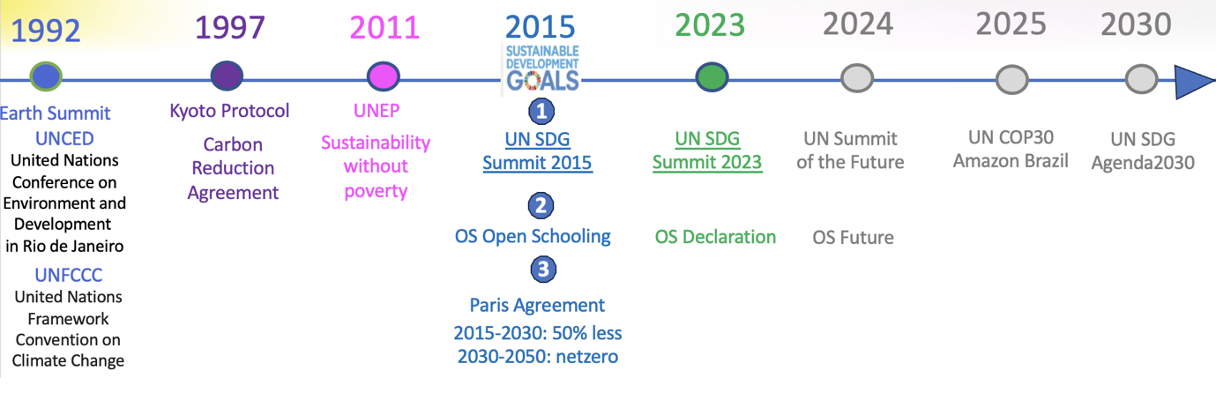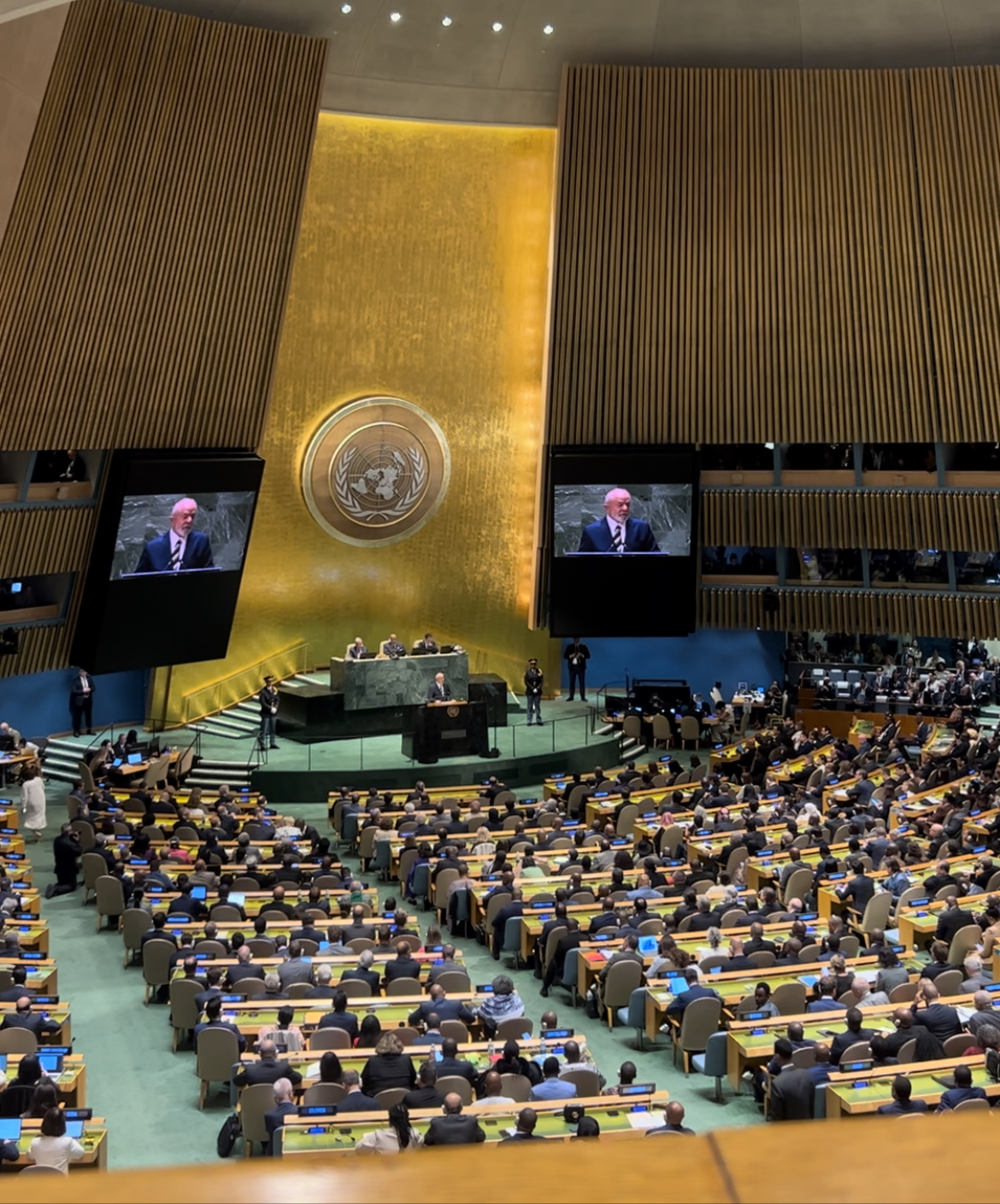News . Our Blog United Nations SDG 2023 Summit Accelerates Progress Towards 2030 Goals.

Can open schooling declaration be integrated into government programs to empower this and next generations?
The United Nations SDG Summit, held on September 18-19, 2023, in New York, marks the beginning of a dynamic new phase in advancing the Sustainable Development Goals (SDGs). During this summit, attendees discussed high-level political commitments emphasizing transformative and hastened actions crucial for achieving the SDGs by 2030.
The event brought together a wide range of influential figures, including government leaders, representatives from international organizations, the private sector, universities, NGOs, and civil society, to address both drivers and barriers. Through a series of high-level meetings, participants engaged in knowledge exchange to tackle global challenges and outline strategies for driving transformation at both local and global levels, ensuring sustainability. While each country has its unique priorities, needs, and capacities, many nations are forging similar pathways toward the SDGs, all with the shared objective of overcoming common challenges among various crises.
The recent report released at the UN (2023) highlights that, midway through the 2030 Agenda, progress to date is significantly off the path to achieving the goals. Projections indicate that it is unlikely the world will achieve the SDGs by 2030. Based on this report, the need for universal science-based tools, adapted and applied to different contexts, has been emphasized as essential to accelerate transformations towards the SDGs and to address common barriers and impediments. The future acceleration model suggested in this document serves as a call to action for transformations that ensure an inclusive, equitable, and peaceful world.
Open Schooling Declaration and AGENDA2030: The Power of Acceleration
During the SDG2023 week at the UN, Dr Alexandra Okada from the Open University represented the CONNECT project and the Open Schooling Together network. She introduced the Open Schooling Declaration (OSD) as a strategy to accelerate the promotion of quality education. The Open Schooling movement also emerged in 2015 in the report “Science Education for responsible citizenship” launched in the same year of ‘The Sustainable Development Goals’. The Open Schooling approach involves integrating real-world SDG-related issues into primary, secondary and tertiary education that local communities care about (CARE), want to know more about (KNOW), and can take action to contribute solutions (DO). The CARE-KNOW-DO model was presented, including the Open Schooling Declaration and the CONNECT-Science instrument for young people’s self-assessment of self-efficacy and self-concept of science and technology in their lives.
The Open Schooling Declaration (OSD) has the potential to help governments and non state actors educate the current generation by aligning knowledge, skills, attitudes, and values with real-world challenges for the 2030 Agenda. The OSD can serve as a valuable tool to reinforce the five key strategies of the SDG acceleration plan. These strategies include:
- Encourage public engagement through socioscientific thinking for broader and more meaningful community representation.
- Strengthen the capacity of economic levers that improve decision-making with the cooperation of different actors
- Development of data and science-based tools through collaborations between universities, schools, local communities, businesses, and policy authorities.
- Foster new partnerships that bridge the domains of science, policy, education, and society to empower students with real-world problem-solving skills.
- Ensure accountability by monitoring progress, providing input and feedback to stakeholders, and identifying appropriate incentives for transformative change.
In the SDG acceleration plan involving six crucial strategies, open schooling can play a catalytic role in improving the SDG4 – quality of education articulated with all sixteen SDGs. Figure 1 summarises essential steps for transformative change integrated with open schooling to support leaders in seeking catalysts in education.

Figure 1 – Open Schooling Declaration and United Nations Acceleration Plan (Okada, 2023)
- Develop National Plans of action to accelerate SDGs
- (OSD-01) Open Schooling aims to transform education by empowering students with science for wellbeing, better lives, and sustainability.
- (OSD-07) Flexible, engaging, and meaningful curricula with real-world applications help learners move from surface to deep learning.
- Develop an international OS-SDG showcase with effective OS partnerships.
- Support knowledge exchange and capacity building for scalability.
- Encourage business and organisations to share learning
- (OSD-02) Open schooling aims to improve authentic education by bringing together schools, universities, businesses, civil society and policy makers.
- (OSD-05) Students solve real-life problems in and out of school using participatory methods with scientists, professionals and communities.
- Establish partnerships with enterprises that align with SDGs.
- Recognise issues and skills demonstrated by professionals in support of the SDGs.
- Employ Economic & Financial Levers (inter & national)
- (OSD-03) Open Schooling aims to expand scientifically literate generations who care about real issues, know, and take action.
- (OSD-04) Students, as agents of change, learn responsible research and innovation to create a sustainable future with desirable careers.
- Identify sustainable incentives for partnerships.
- Explore new grants to support and expand existing OS networks.
- Invest in Data and Science-Based Tools and policy learning
- (OSD-06) Students develop skills in authentic contexts, using scientific thinking and interdisciplinary knowledge.
- (OSD-10) Open Schooling prioritises students’ individual learning needs, involving families, policy specialists, resources, and technologies.
- Create a repository with evidence-based data, tools research and policy.
- Increase Open Schooling awareness with science-tools and digital social media.
- Strengthen science-policy-society interface
- (OSD-08) Science, arts, and humanities curricula connect students to cocreate knowledge and practice skills relevant to them.
- (OSD-12) Formal, non formal, & informal learning ecologies help foster students’ sense of belonging, enjoyment, and confidence in science for life.
- Expand number of OS research with PhD students from different fields.
- Embed knowledge about Open Schooling in teacher education courses.
- Improve Accountability of stakeholders
- (OSD-09) Open Schooling curricula stimulate students’ curiosity, appropriation and citizenship, enabling them to act responsibly with responsive actions.
- (OSD-11) In the digital age, Open Schooling networks for cooperation between students and experts can improve open democracy and social justice at local and global levels.
- Update curriculum plans with OS+SDGs evidence-based tools and recommendations.
- Connect underserved learners and less-represented communities with Open Schooling initiatives.
Open Schooling Declaration in the context of the UN SDG Acceleration Action
Science is at the heart of tackling global challenges and advancing the SDGs. From eradicating poverty to tackling climate change and biodiversity loss, science provides the foundation for transformative change. It thrives when multidisciplinary, ethical, inclusive, trustworthy, open, and socially robust education.
Open Schooling is a crucial component in advancing SDG Acceleration Actions, serving as a science-based tool to address common obstacles and foster a more inclusive, equitable, and peaceful world. It achieves this by optimising a meaningful learning continuum accessible to all, connecting a diverse range of learning environments, including homes, museums, libraries, parks, centres, and digital media. This educational approach uses authentic science-based education and multidisciplinary approaches involving partnerships between schools, universities, businesses, civil society, and policymakers. Its goal is to empower all students, including young people from underserved communities, to use scientific thinking with real-life issues that can contribute to the advancement of the SDGs. Open Schooling is characterised as inclusive, reliable, and socially robust, implying that it is a means of providing accessible and quality education to a broad and diverse population.
Open Schooling for Sustainable Development
Open Schooling is instrumental in empowering the next generation, especially young people facing challenges resulting from the pandemic, underserved learners, and vulnerable communities affected by climate change, sustainability issues, global economic crises, and rising unemployment. It is also designed to address the difficulties in supporting student retention and progression. This holistic pedagogy provides students not only with academic knowledge but also practical skills, attitudes, and values essential for fostering a socially resilient society, human well-being, and the transition to a digital and green economy. It acknowledges that education should extend beyond the confines of the classroom to encompass various facets of life, nurturing well-rounded individuals who are prepared to tackle real-life issues of the 21st century.
Understanding what and how transformations can be implemented is key, and here the concept of SDG Accelerations Actions comes to the fore. Deliberate and desirable transformations, vital to achieving the SDGs, are possible. Education plays a key role in prioritising this search for sustainable development. In this context, Open Schooling is designed to empower students to become decision-makers by engaging in discussions, engaging their communities and experts, and adopting transdisciplinary approaches. It equips them to make informed decisions, take impactful actions, and provide recommendations. As we face times of crisis and change, SDG Acceleration Actions and science-based solutions provide hope for a better future. By embracing these initiatives, nurturing tomorrow’s leaders and fostering collaboration through open education, open universities and open schools, we can work together to achieve the SDGs.
The UN 2030 Summit serves as a platform for dialogue and action, uniting stakeholders from around the world in the pursuit of sustainable development. We can create a better world and a better future by doubling our efforts to achieve the Sustainable Development Goals by making the transformative changes enshrined in the 2030 Agenda. Through these actions toward 2030 (See Fig. 2), we can withstand global shocks, build resilience, and emerge stronger with Open Schooling ready to meet the challenges that lie ahead.

Figure 2 – Timeline Toward Agenda 2030 with Open Schooling
Reference:
Independent Group of Scientists appointed by the Secretary-General, Global Sustainable Development Report 2023: Times of crisis, times of change: Science for accelerating transformations to sustainable development, (United Nations, New York, 2023). https://sdgs.un.org/sites/default/files/2023-09/FINAL%20GSDR%202023-Digital%20-110923_1.pdf
